Unit 2 I think that mooncakes are delicious! Section A 2a-2d 课件(共28张PPT)
文档属性
| 名称 | Unit 2 I think that mooncakes are delicious! Section A 2a-2d 课件(共28张PPT) | 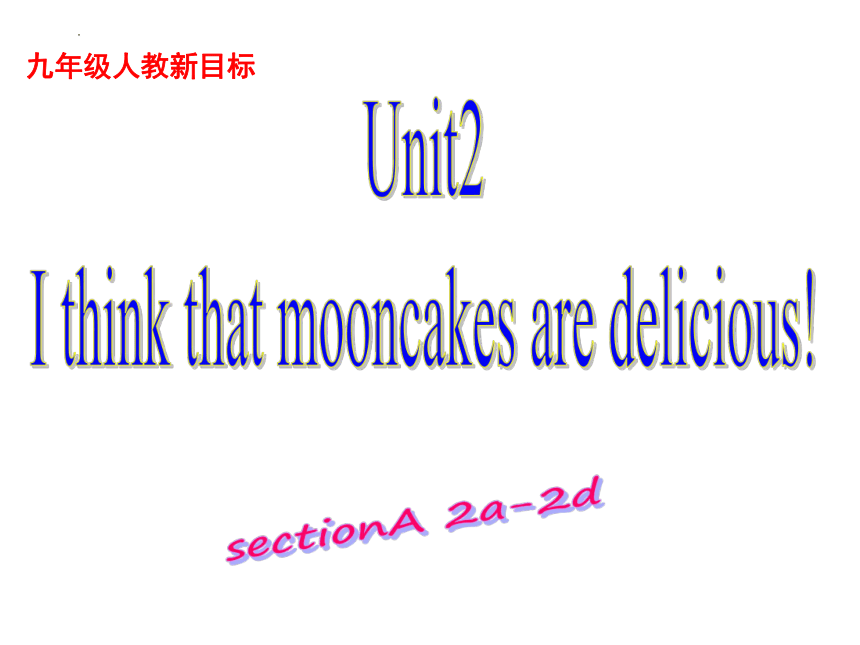 | |
| 格式 | pptx | ||
| 文件大小 | 1.8MB | ||
| 资源类型 | 教案 | ||
| 版本资源 | 人教新目标(Go for it)版 | ||
| 科目 | 英语 | ||
| 更新时间 | 2024-07-11 06:58:11 | ||
图片预览

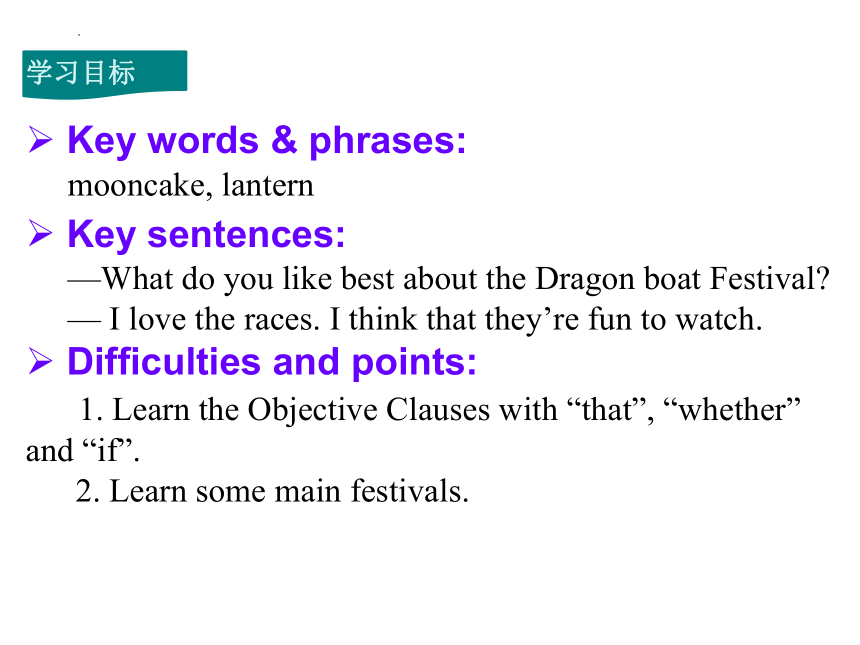
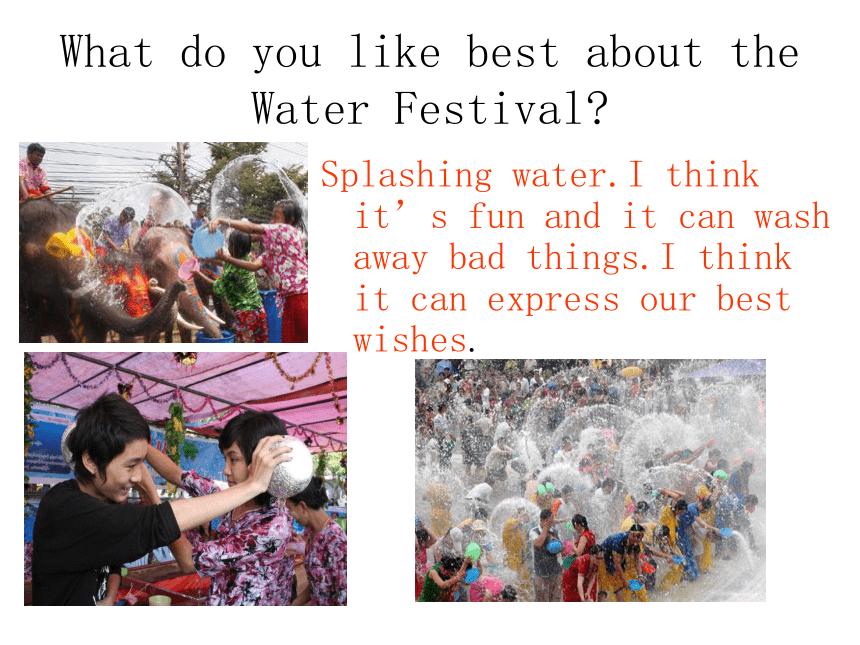
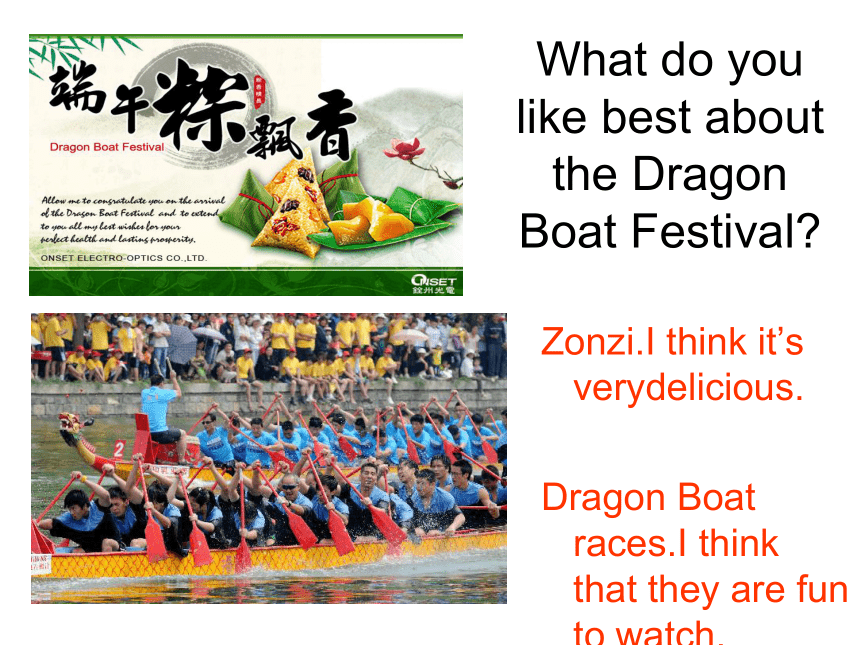
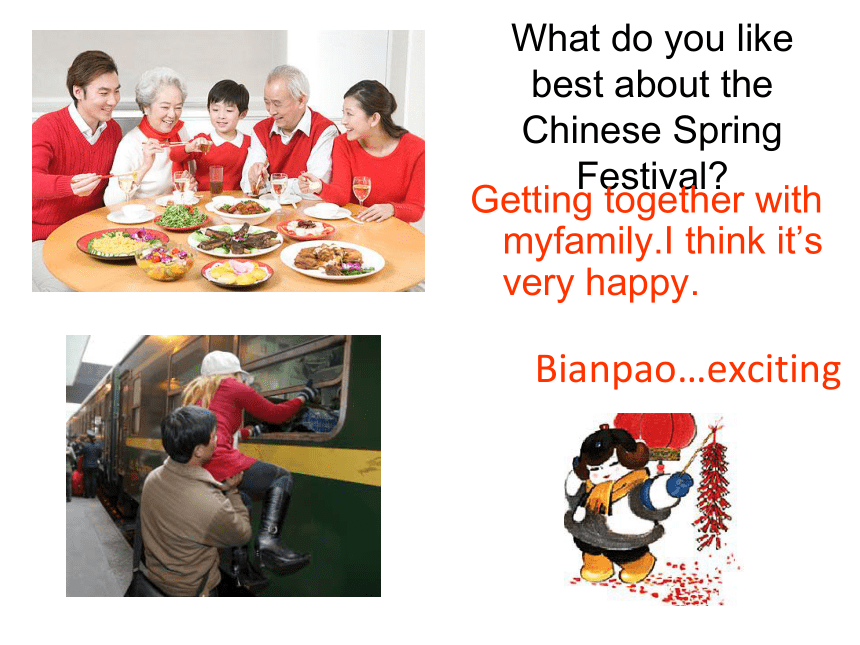
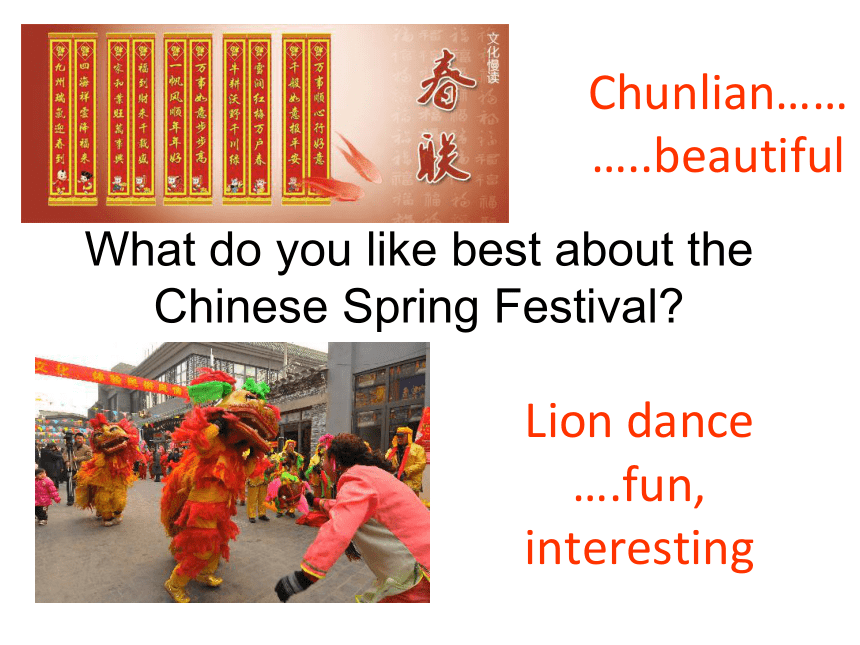

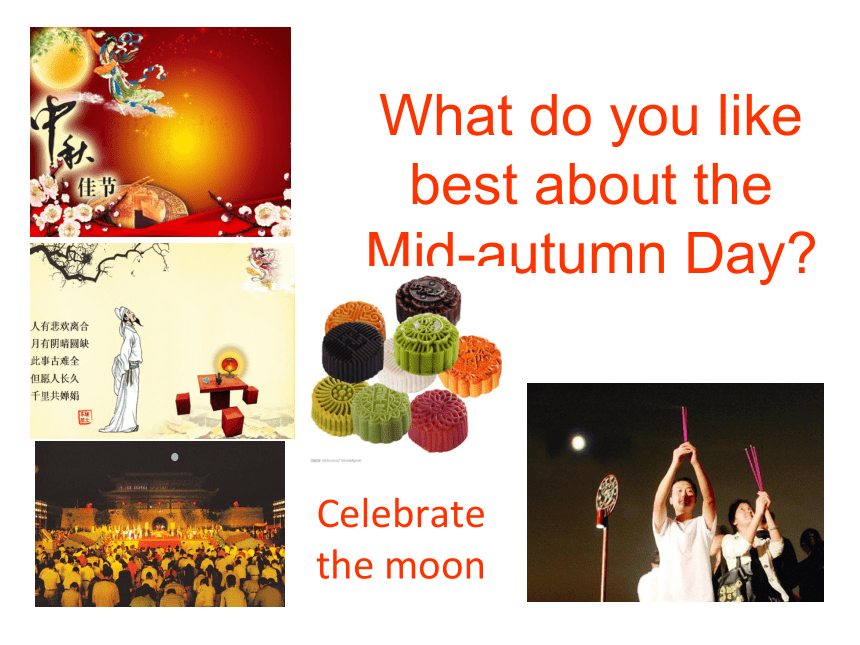
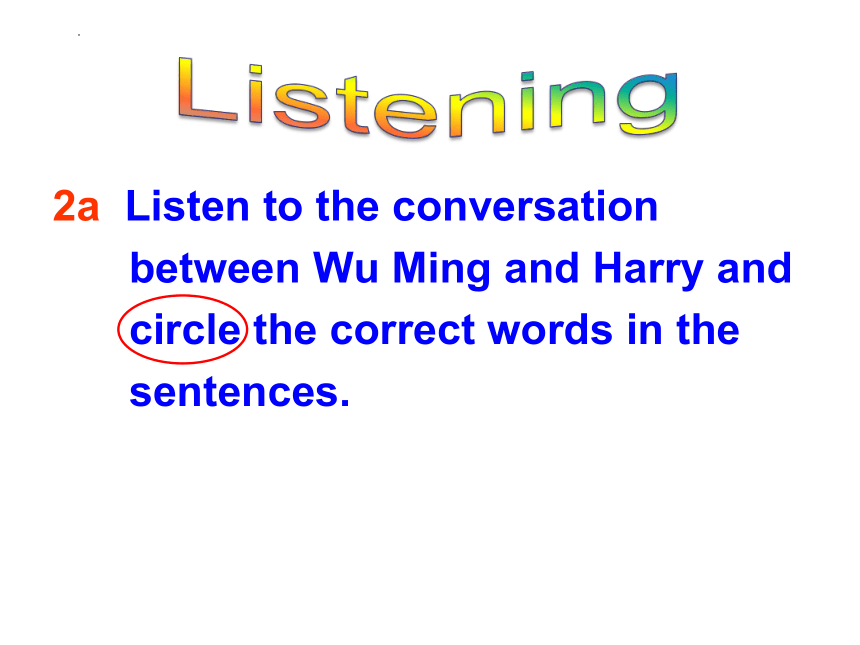
文档简介
(共28张PPT)
九年级人教新目标
sectionA 2a-2d
Unit2
I think that mooncakes are delicious!
Key words & phrases:
mooncake, lantern
Key sentences:
—What do you like best about the Dragon boat Festival
— I love the races. I think that they’re fun to watch.
Difficulties and points:
1. Learn the Objective Clauses with “that”, “whether” and “if”.
2. Learn some main festivals.
学习目标
What do you like best about the Water Festival
Splashing water.I think it’s fun and it can wash away bad things.I think it can express our best wishes.
What do you like best about the Dragon Boat Festival
Zonzi.I think it’s verydelicious.
Dragon Boat races.I think that they are fun to watch.
What do you like best about the Chinese Spring Festival
Getting together with myfamily.I think it’s very happy.
Bianpao…exciting
What do you like best about the Chinese Spring Festival
Chunlian………..beautiful
Lion dance ….fun, interesting
What do you like best about the Lantern Festival
Tangyuan.I think…delicious.
Lantern show.I think…beautiful.
What do you like best about the Mid-autumn Day
Celebrate the moon
Listening
2a Listen to the conversation between Wu Ming and Harry and circle the correct words in the sentences.
1. Wu Ming and Harry are cousins/
strangers / friends.
2. Wu Ming went to Singapore/
Hong Kong / Macao for his vacation.
3. Wu Ming visited his relatives / friends /
classmates.
4. Wu Ming liked eating out / shopping /
the Dragon Boat Festival best.
n. 陌生人
n. 亲属,亲戚
2b Wu Ming did a lot of fun activities, but there were also downsides. Listen again and fill in the chart.
Fun activities Downsides
Eating out
Shopping
Dragon Boat Festival in June
He has put on five pounds!
He spent so much money.
It’s quite hot in June.
增加(体重); 发胖
2c Role-play conversations between Wu Ming and Harry. Use the information in 2a and 2b or make your own conversations.
Speaking
Read the conversation between Clara and Ben, answer the questions.
2d
1. Where is Clara going in two weeks
She's going to Chiang Mai.
2. Why is she going there in the hottest month
Because there is a Water Festival.
3. When is the Thai New Year
It's from April 13th to April 15th.
4. Is there the Water Festival in China
Yes. The Dai people in Yunnan Province.
Why do people go on streets to throw water at each other
Because the new year is a time for cleaning
and washing away bad things.
Fill in blanks.
Clara: Guess what I'm going to Chiang Mai in two weeks.
Ben: Wow, ______________ But I believe that April is the hottest month of year there.
Clara: _______________. But there is a Water Festival from April from April 13th to 15th.
Ben: ____________________________________ of the the Dai people in Yunnan Province.
Clara: ______________, This is a time of the Thai New Year. People go on the streets to throw water at each other.
Ben: Cool! But why do they do that
Clara: Because the new year is a time____
_______________________________. Then you will
have good luck in the new year.
sounds like fun!
Yes, that's true.
I wonder if it's similar to the water festival
Yes, I think so.
for
cleaning and washing away bad things
Task4. Retell the conversation.
When When is the Water Festival
Where Where is the Water Festival
Chiang Mai in Thailand and Dai in Yunnan Province.
What What is the Water Festival
People go on the streets to throw water at each other.
Why Why do people do that
Because the new year is a time for cleaning and washing away bad things.Then you'll have good luck in the new year.
It is from April 13th to 15th.
wonder 此处用于及物动词,意为想知道,相当于want to know.wonder在不同句式中表达的意思也不相同:
1.后接who,what,why等连接词引导的宾语从句或者“特殊疑问词+不定式”结构,意为“想知道”。
2.后接if或whether引导的宾语从句时,表示一种委婉的请求和疑问。
3.wonder还可以作名词,意为“奇迹,奇观”
1.believe 用作及物动词,意为相信,认为有可能,后接名词代词作宾语,也可加that 引导的宾语从句
2.believe sb. to be相信某人会成为
3.believe/think等词构成否定句时,要否定前置。
例句:I don't think/believe he is a good partner.
4.believe通常不用于进行时态
1.in+two weeks 在两周后,提问用how soon.
2.
3.be similar to...与...相似 similar做形容词,相似的,相像的
be similar in...在...方面相似
in+一段时间 表示将来一段时间以后,常用于一般将来时
after+一段时间 表示过去为起点一段时间以后,常与过去时态连用
true 强调事实,非捏造 The story is true.
real 强调客观真实存在,非想象 It is a real bear,not a toy.
4.throw...at...意为”朝...扔...”at后接抛洒对象,throw是及物动词
throw away 扔掉,丢弃,错过
throw over 放弃,背弃,抛弃
throw sb.sth=throw sth.to sb 扔给某人某物
luckn.运气 luckyadj.幸运的 luckily adv.幸运地
unlucky adj.不幸的
unluckily adv.不幸地
一、宾语从句的概念
宾语从句即句子作宾语,而不再是一个词或短语作宾语。
I like my teacher.(名词作宾语)
I know him .(代词作宾语)
I know Mr Li teaches English. (句子作宾语)
包含宾语从句的句子结构:
主句+连接词(引导词)+宾语从句
由从属连词that引导的宾语从句
注:that 在句中无词汇意义,在从句中不能充当成分,
在口语当中往往省略
e.g.
I hear (that) _______________________. (一小时后他会回来)
He said (that) ______________________. (他非常想念我们)
The teacher told us (that) ___________________________.
(地球围着太阳转)
he will be back in an hour
he missed us very much
the earth moves around the sun
注意:当从句是客观真理的时候,无论主句什么时态,从句一律用一般现在时
由从属连词whether, if 引导的宾语从句
e.g.
1. Ask him _____________________. (他是否能来)
2. I don’t know ___________________________.(是否要下雨)
whether (if) he can come
whether it is going to rain or not
当句末为or not时,引导词只能用whether而不能用if.
If 与whether 的区别
I don’t know _____ he will come or not.
I don’t care of ______ he is handsome.
He wondered ______ to stay here the next week.
____ he will come is not decided.
与or not 连用只能用whether
介词后只能用whether
与to do 不定式连用只能用whether
作主语只能用whether
顾名思义感叹句就是英语中带有感叹号的句子,表示说话人惊奇、愤怒、赞美、喜悦等情绪。
近年来,感叹句的构成及转换是中考常考的考点之一。
感叹句一般是由“what” 和“how”来开头的句子,“what”修饰名词,“how”修饰形容词和副词。
1. ( ) —Do you know ____ Jane visits her
grandparents
—Once a week.
A. how soon B. how often
C. how long D. how far
2. ( ) —I want to know ____.
—Sorry. I’ve no idea. But she was
here just now.
A. where is Ann B. where Ann is
C. where was Ann D. where Ann was
B
B
Exercises
3. ( ) —Hi, Bruce. Here is a letter for you.
—Thanks. I wonder ____.
A. who the letter was from
B. who was from the letter
C. who was the letter from
D. who from the letter was
4. ( ) —Do you know _____
—He is a dentist.
A. where he is from B. where is he from
C. what does his father do
D. what his father is
A
D
根据所给汉语填空
1. Can you see the _________ (灯笼) over there How beautiful they are!
2. Parents often tell their children not to speak to _________ (陌生人).
3. I got a lot of gifts from my _________
(亲戚) on my birthday.
4. Don’t eat too much, or you’ll _______
(增加) your weight.
5. The car cost him 2000 _______ (英镑).
lanterns
strangers
relatives
put on
pounds
Homework
1. Learn the new words and expressions by heart.
2. Copy the sentences with the Objective Clause and learn them by heart.
九年级人教新目标
sectionA 2a-2d
Unit2
I think that mooncakes are delicious!
Key words & phrases:
mooncake, lantern
Key sentences:
—What do you like best about the Dragon boat Festival
— I love the races. I think that they’re fun to watch.
Difficulties and points:
1. Learn the Objective Clauses with “that”, “whether” and “if”.
2. Learn some main festivals.
学习目标
What do you like best about the Water Festival
Splashing water.I think it’s fun and it can wash away bad things.I think it can express our best wishes.
What do you like best about the Dragon Boat Festival
Zonzi.I think it’s verydelicious.
Dragon Boat races.I think that they are fun to watch.
What do you like best about the Chinese Spring Festival
Getting together with myfamily.I think it’s very happy.
Bianpao…exciting
What do you like best about the Chinese Spring Festival
Chunlian………..beautiful
Lion dance ….fun, interesting
What do you like best about the Lantern Festival
Tangyuan.I think…delicious.
Lantern show.I think…beautiful.
What do you like best about the Mid-autumn Day
Celebrate the moon
Listening
2a Listen to the conversation between Wu Ming and Harry and circle the correct words in the sentences.
1. Wu Ming and Harry are cousins/
strangers / friends.
2. Wu Ming went to Singapore/
Hong Kong / Macao for his vacation.
3. Wu Ming visited his relatives / friends /
classmates.
4. Wu Ming liked eating out / shopping /
the Dragon Boat Festival best.
n. 陌生人
n. 亲属,亲戚
2b Wu Ming did a lot of fun activities, but there were also downsides. Listen again and fill in the chart.
Fun activities Downsides
Eating out
Shopping
Dragon Boat Festival in June
He has put on five pounds!
He spent so much money.
It’s quite hot in June.
增加(体重); 发胖
2c Role-play conversations between Wu Ming and Harry. Use the information in 2a and 2b or make your own conversations.
Speaking
Read the conversation between Clara and Ben, answer the questions.
2d
1. Where is Clara going in two weeks
She's going to Chiang Mai.
2. Why is she going there in the hottest month
Because there is a Water Festival.
3. When is the Thai New Year
It's from April 13th to April 15th.
4. Is there the Water Festival in China
Yes. The Dai people in Yunnan Province.
Why do people go on streets to throw water at each other
Because the new year is a time for cleaning
and washing away bad things.
Fill in blanks.
Clara: Guess what I'm going to Chiang Mai in two weeks.
Ben: Wow, ______________ But I believe that April is the hottest month of year there.
Clara: _______________. But there is a Water Festival from April from April 13th to 15th.
Ben: ____________________________________ of the the Dai people in Yunnan Province.
Clara: ______________, This is a time of the Thai New Year. People go on the streets to throw water at each other.
Ben: Cool! But why do they do that
Clara: Because the new year is a time____
_______________________________. Then you will
have good luck in the new year.
sounds like fun!
Yes, that's true.
I wonder if it's similar to the water festival
Yes, I think so.
for
cleaning and washing away bad things
Task4. Retell the conversation.
When When is the Water Festival
Where Where is the Water Festival
Chiang Mai in Thailand and Dai in Yunnan Province.
What What is the Water Festival
People go on the streets to throw water at each other.
Why Why do people do that
Because the new year is a time for cleaning and washing away bad things.Then you'll have good luck in the new year.
It is from April 13th to 15th.
wonder 此处用于及物动词,意为想知道,相当于want to know.wonder在不同句式中表达的意思也不相同:
1.后接who,what,why等连接词引导的宾语从句或者“特殊疑问词+不定式”结构,意为“想知道”。
2.后接if或whether引导的宾语从句时,表示一种委婉的请求和疑问。
3.wonder还可以作名词,意为“奇迹,奇观”
1.believe 用作及物动词,意为相信,认为有可能,后接名词代词作宾语,也可加that 引导的宾语从句
2.believe sb. to be相信某人会成为
3.believe/think等词构成否定句时,要否定前置。
例句:I don't think/believe he is a good partner.
4.believe通常不用于进行时态
1.in+two weeks 在两周后,提问用how soon.
2.
3.be similar to...与...相似 similar做形容词,相似的,相像的
be similar in...在...方面相似
in+一段时间 表示将来一段时间以后,常用于一般将来时
after+一段时间 表示过去为起点一段时间以后,常与过去时态连用
true 强调事实,非捏造 The story is true.
real 强调客观真实存在,非想象 It is a real bear,not a toy.
4.throw...at...意为”朝...扔...”at后接抛洒对象,throw是及物动词
throw away 扔掉,丢弃,错过
throw over 放弃,背弃,抛弃
throw sb.sth=throw sth.to sb 扔给某人某物
luckn.运气 luckyadj.幸运的 luckily adv.幸运地
unlucky adj.不幸的
unluckily adv.不幸地
一、宾语从句的概念
宾语从句即句子作宾语,而不再是一个词或短语作宾语。
I like my teacher.(名词作宾语)
I know him .(代词作宾语)
I know Mr Li teaches English. (句子作宾语)
包含宾语从句的句子结构:
主句+连接词(引导词)+宾语从句
由从属连词that引导的宾语从句
注:that 在句中无词汇意义,在从句中不能充当成分,
在口语当中往往省略
e.g.
I hear (that) _______________________. (一小时后他会回来)
He said (that) ______________________. (他非常想念我们)
The teacher told us (that) ___________________________.
(地球围着太阳转)
he will be back in an hour
he missed us very much
the earth moves around the sun
注意:当从句是客观真理的时候,无论主句什么时态,从句一律用一般现在时
由从属连词whether, if 引导的宾语从句
e.g.
1. Ask him _____________________. (他是否能来)
2. I don’t know ___________________________.(是否要下雨)
whether (if) he can come
whether it is going to rain or not
当句末为or not时,引导词只能用whether而不能用if.
If 与whether 的区别
I don’t know _____ he will come or not.
I don’t care of ______ he is handsome.
He wondered ______ to stay here the next week.
____ he will come is not decided.
与or not 连用只能用whether
介词后只能用whether
与to do 不定式连用只能用whether
作主语只能用whether
顾名思义感叹句就是英语中带有感叹号的句子,表示说话人惊奇、愤怒、赞美、喜悦等情绪。
近年来,感叹句的构成及转换是中考常考的考点之一。
感叹句一般是由“what” 和“how”来开头的句子,“what”修饰名词,“how”修饰形容词和副词。
1. ( ) —Do you know ____ Jane visits her
grandparents
—Once a week.
A. how soon B. how often
C. how long D. how far
2. ( ) —I want to know ____.
—Sorry. I’ve no idea. But she was
here just now.
A. where is Ann B. where Ann is
C. where was Ann D. where Ann was
B
B
Exercises
3. ( ) —Hi, Bruce. Here is a letter for you.
—Thanks. I wonder ____.
A. who the letter was from
B. who was from the letter
C. who was the letter from
D. who from the letter was
4. ( ) —Do you know _____
—He is a dentist.
A. where he is from B. where is he from
C. what does his father do
D. what his father is
A
D
根据所给汉语填空
1. Can you see the _________ (灯笼) over there How beautiful they are!
2. Parents often tell their children not to speak to _________ (陌生人).
3. I got a lot of gifts from my _________
(亲戚) on my birthday.
4. Don’t eat too much, or you’ll _______
(增加) your weight.
5. The car cost him 2000 _______ (英镑).
lanterns
strangers
relatives
put on
pounds
Homework
1. Learn the new words and expressions by heart.
2. Copy the sentences with the Objective Clause and learn them by heart.
同课章节目录
- Unit 1 How can we become good learners.
- Section A
- Section B
- Unit 2 I think that mooncakes are delicious!
- Section A
- Section B
- Unit 3 Could you please tell me where the restroom
- Section A
- Section B
- Unit 4 I used to be afraid of the dark.
- Section A
- Section B
- Unit 5 What are the shirts made of?
- Section A
- Section B
- Review of Units 1-5
- Unit 6 When was it invented?
- Section A
- Section B
- Unit 7 Teenagers should be allowed to choose their
- Section A
- Section B
- Unit 8 It must belong to Carla.
- Section A
- Section B
- Unit 9 I like music that I can dance to.
- Section A
- Section B
- Unit 10 You're supposed to shake hands.
- Section A
- Section B
- Review of Units 6-10
- Unit 11 Sad movies make me cry.
- Section A
- Section B
- Unit 12 Life is full of the unexpected
- Section A
- Section B
- Unit 13 We're trying to save the earth!
- Section A
- Section B
- Unit 14 I remember meeting all of you in Grade 7.
- Section A
- Section B
- Review of Units 11-14
